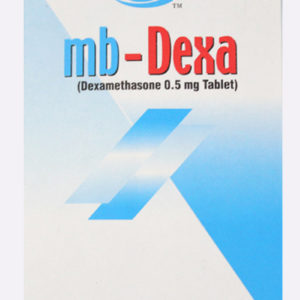Showing the single result

Each tablet contains:
Dexamethasone Sodium 0.5mg
Indicated in a wide variety of disorders amenable to glucocorticoid therapy, as well
as an adjunct in the control of cerebral edema.
Dexamethasone is used to treat conditions such as arthritis, blood/hormone/immune system disorders, allergic reactions, certain skin and eye conditions, breathing problems, certain bowel disorders, and certain cancers. It is also used as a test for an adrenal gland disorder (Cushing's syndrome). This medication is a corticosteroid hormone (glucocorticoid). It decreases your body's natural defensive response and reduces symptoms such as swelling and allergic-type reactions.
In general, glucocorticoid dosage depends on the severity of the condition and response of the patient. Under certain circumstances, for instance in stress and changed clinical picture, extra dosage adjustments may be necessary. If no favourable response is noted within a couple of days, glucocorticoid therapy should be discontinued.
Usually, daily oral dosages of 0.5 – 10 mg are sufficient. In some patients higher dosages may be temporarily required to control the disease. Once the disease is under control, the dosage should be reduced or tapered off to the lowest suitable level under continuous monitoring and observation of the patient.
For a short dexamethasone suppression test, 1 mg dexamethasone is given at 11 pm and plasma cortisol measured the next morning. Patients who do not show a decrease in cortisol can be exposed to a longer test: 500 micrograms dexamethasone is given at 6 hourly intervals for 48 hours followed by 2 mg every 6 hours for a further 48 hours. Twenty-four hour urine collections are made before, during and at the end of the test for determination of 17-hydroxycorticosteroids.
0.01-0.1 mg/kg of body weight daily.
Dosage of glucocorticoids should be adjusted on the basis of the individual patient's response.
Or as directed by the physicianComposition: Each tablet contains:
Dexamethasone Sodium 0.5mg
Indicated in a wide variety of disorders amenable to glucocorticoid therapy, as well
as an adjunct in the control of cerebral edema.
Dexamethasone is used to treat conditions such as arthritis, blood/hormone/immune system disorders, allergic reactions, certain skin and eye conditions, breathing problems, certain bowel disorders, and certain cancers. It is also used as a test for an adrenal gland disorder (Cushing's syndrome). This medication is a corticosteroid hormone (glucocorticoid). It decreases your body's natural defensive response and reduces symptoms such as swelling and allergic-type reactions.
In general, glucocorticoid dosage depends on the severity of the condition and response of the patient. Under certain circumstances, for instance in stress and changed clinical picture, extra dosage adjustments may be necessary. If no favourable response is noted within a couple of days, glucocorticoid therapy should be discontinued.
Usually, daily oral dosages of 0.5 – 10 mg are sufficient. In some patients higher dosages may be temporarily required to control the disease. Once the disease is under control, the dosage should be reduced or tapered off to the lowest suitable level under continuous monitoring and observation of the patient (See Section 4.4).
For a short dexamethasone suppression test, 1 mg dexamethasone is given at 11 pm and plasma cortisol measured the next morning. Patients who do not show a decrease in cortisol can be exposed to a longer test: 500 micrograms dexamethasone is given at 6 hourly intervals for 48 hours followed by 2 mg every 6 hours for a further 48 hours. Twenty-four hour urine collections are made before, during and at the end of the test for determination of 17-hydroxycorticosteroids.
0.01-0.1 mg/kg of body weight daily.
Dosage of glucocorticoids should be adjusted on the basis of the individual patient's response.
Or as directed by the physician